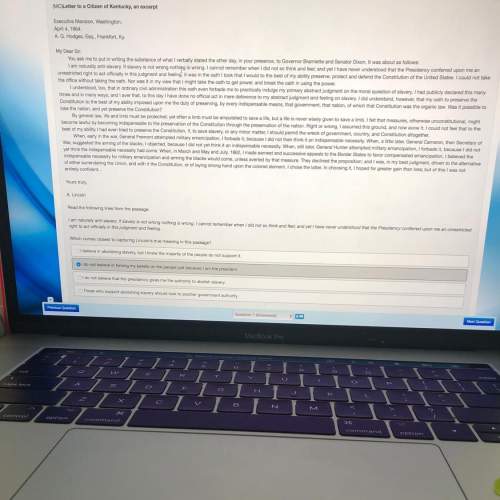(lc) letter to a citizen of kentucky, an excerpt

English, 02.09.2019 02:20 natalievick03
Question 1 multiple choice worth 4 points)
(lc) letter to a citizen of kentucky, an excerpt
executive mansion, washington,
april 4, 1864
a g. hodges, esq., frankfort, ky
my dear sir.
you ask me to put in writing the substance of what i verbally stated the other day, in your presence, to governor bramlette and senator dixon. it was about as follows:
i am naturally anti-slavery. if slavery is not wrong nothing is wrong. i cannot remember when i did not so think and feel and yet i have never understood that the presidency conferred upon me an
unrestricted right to act officially in this judgment and feeling. it was in the oath i took that i would to the best of my ability preserve, protect and defend the constitution of the united states. i could not take
the office without taking the oath nor was it in my view that i might take the oath to get power, and break the oath in using the power
i understood, too, that in ordinary civil administration this oath even forbade me to practically indulge my primary abstract judgment on the moral question of slavery. i had publicly declared this many
times and in many ways, and laver that, to this day i have done no official act in mere deference to my abstract judgment and feeling on slavery. i did understand, however, that my oath to preserve the
constitution to the best of my ability imposed upon me the duty of preserving, by every indispensable means that government, that nation, of which that constitution was the organic law. was it possible to
lose the nation, and yet preserve the constitution?
by general law, life and limb must be protected: yet ofton a limb must be amputated to save a life, but a life is never wisely given to save a limb. i felt that measures, otherwise unconstitutional, might
become lawful by becoming indispensable to the preservation of the constitution through the preservation of the nation. right or wrong. i assumed this ground, and now avow it. i could not feel that to the
best of my ability i had even tried to preserve the constitution, if, to save slavery, or any minor matter, i should permit the wreck of government, country, and constitution altogether.
when early in the war, general fremont attempted military emancipation, i forbade it, because i did not then think it an indispensable necessity. when, a little later, general cameron, then secretary of
war, suggested the arming of the blacks, i objected, because i did not yet think it an indispensable necessity. when, still later, general hunter attempted military emancipation, i forbade it, because i did not
yet think the indispensable necessity had come. when, in march and may and july, 1862, i made eamest and successive appeals to the border states to favor compensated emancipation, i believed the
indispensable necessity for military emancipation and arming the blacks would come, unless averted by that measure. they declined the proposition; and i was, in my best judgment, driven to the alternative
of either surrendering the union, and with it the constitution, or of laying strong hand upon the colored element. i chose the latter. in choosing it, i hoped for greater gain than loss; but of this i was not
entirely confident.
yours truly,
a lincoln
use context to determine the meaning of the words in bold.
i made a few angry gestures.
olmade several heartfelt requests.
i made two unenthusiastic attempts.
i made old-fashioned decisions.


Answers: 1


Another question on English

English, 21.06.2019 16:00
When gatsby was in europe after world war i and circumstances forced daisy and him to face unpleasant realities about their relationship,
Answers: 1

English, 22.06.2019 04:30
In order really to hate white people, one has to blot so much out of the mind — and the heart — that this hatred itself becomes an exhausting and self-destructive pose. but this does not mean, on the other hand, that love comes easily: the white world is too powerful, too complacent, too ready with gratuitous humiliation, and, above all, too ignorant and too innocent for that.which sentence best explains how the use of parallelism in the excerpt supports baldwin's purpose? a. it proves baldwin's central idea by highlighting the obvious.b. it emphasizes the problems that prevent one from loving the white world.c. it explains why the white world is unable to replace hate with love.d. it enumerates the many ways of dealing with the white world.
Answers: 1

English, 22.06.2019 08:30
At the end of “raymond’s run,” squeaky has a different attitude about running and about her rival, gretchen. describe the actions that demonstrate these changed feelings. what role does conflict play in squeaky’s changed attitude? use events and details from the story to support your answer.
Answers: 3

You know the right answer?
Question 1 multiple choice worth 4 points)
(lc) letter to a citizen of kentucky, an excerpt
(lc) letter to a citizen of kentucky, an excerpt
Questions


Mathematics, 07.12.2021 04:30

Biology, 07.12.2021 04:30


Mathematics, 07.12.2021 04:30


Biology, 07.12.2021 04:30

English, 07.12.2021 04:30


Mathematics, 07.12.2021 04:30



Mathematics, 07.12.2021 04:30




Mathematics, 07.12.2021 04:30


Biology, 07.12.2021 04:30




